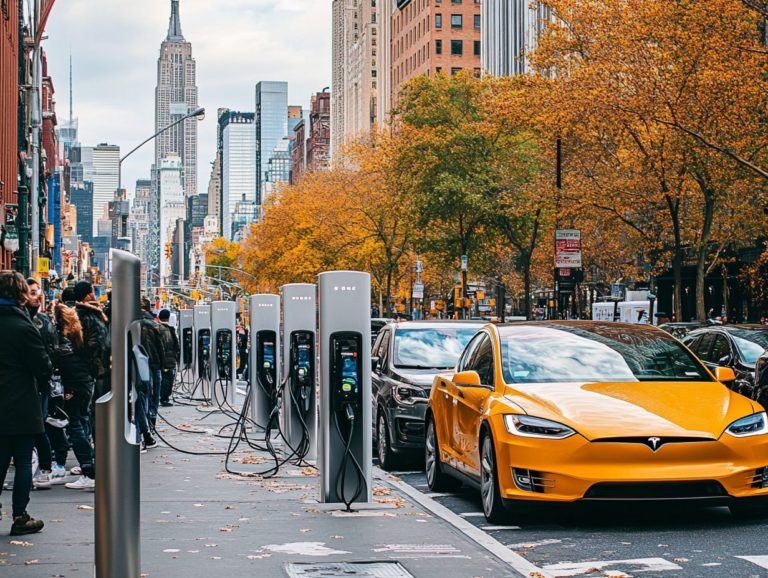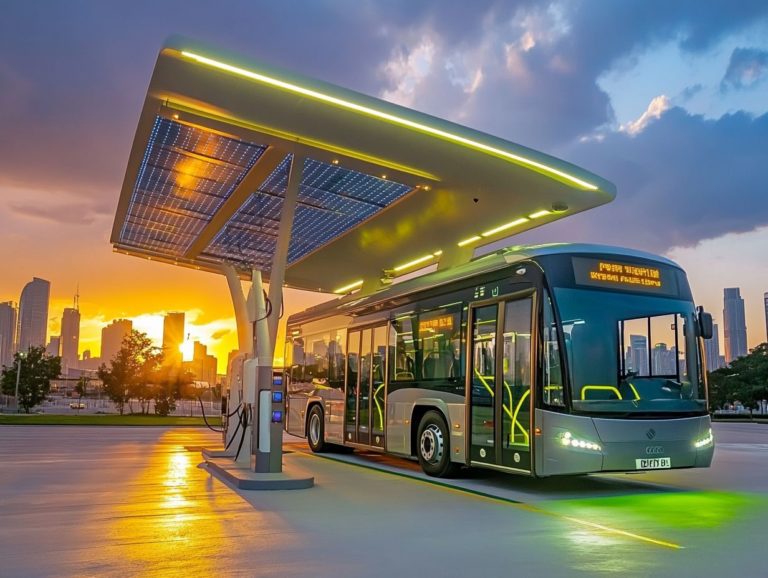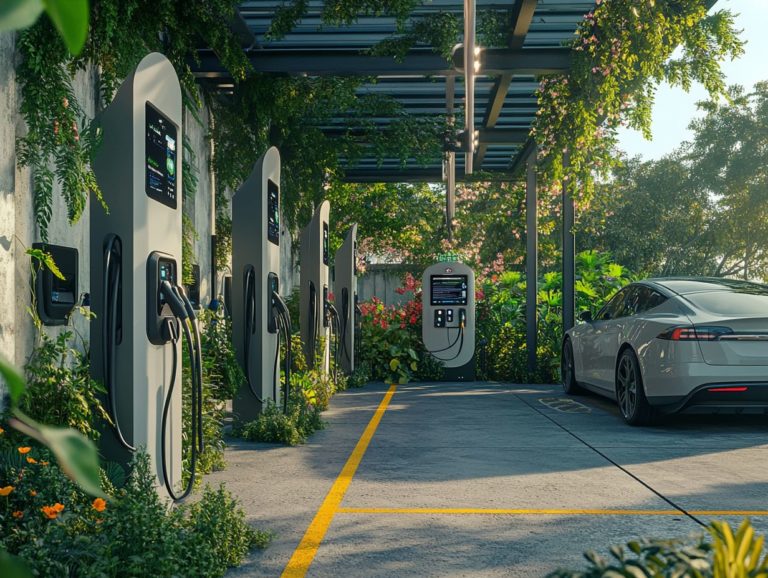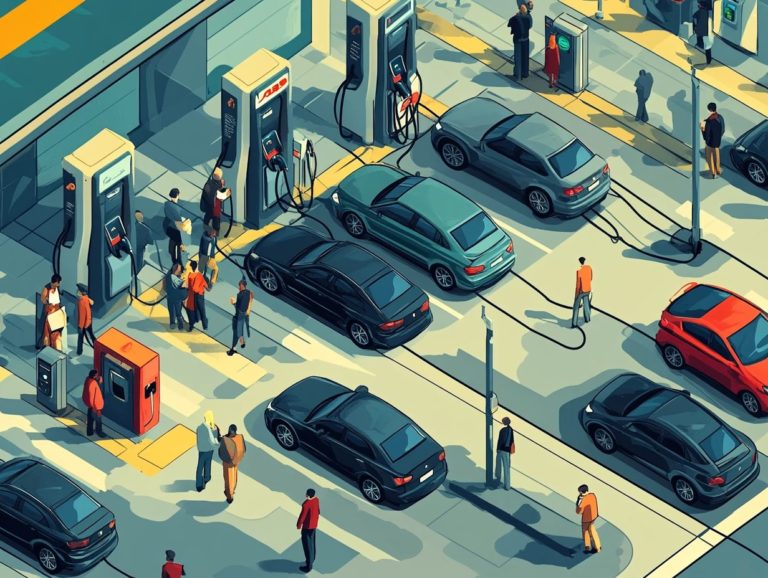how smart technology is changing ev charging
As electric vehicles (EVs) gain momentum around the globe, smart technology is revolutionizing the way you charge them.
With improvements in efficiency and convenience, smart charging solutions are transforming the EV landscape while offering significant cost savings.
This article explores the various types of smart technology available for charging, including wireless options and advanced charging stations.
You ll discover the impact of these innovations on the industry, the challenges they face, and what the future holds for smart EV charging.
Learn how these advancements are propelling the electric vehicle revolution forward.
Contents
- Key Takeaways:
- Benefits of Smart Technology in EV Charging
- Types of Smart Technology in EV Charging
- Impact of Smart Technology on the EV Industry
- Challenges and Limitations of Smart Technology in EV Charging
- The Future of Smart Technology in EV Charging
- Frequently Asked Questions
- How does smart technology improve the efficiency of EV charging?
- What types of smart technology are used in EV charging?
- How does smart technology help with grid integration of EV charging?
- Can smart technology also improve the user experience for EV owners?
- How is smart technology making EV charging more accessible?
- What role does smart technology play in promoting sustainable transportation?
Key Takeaways:
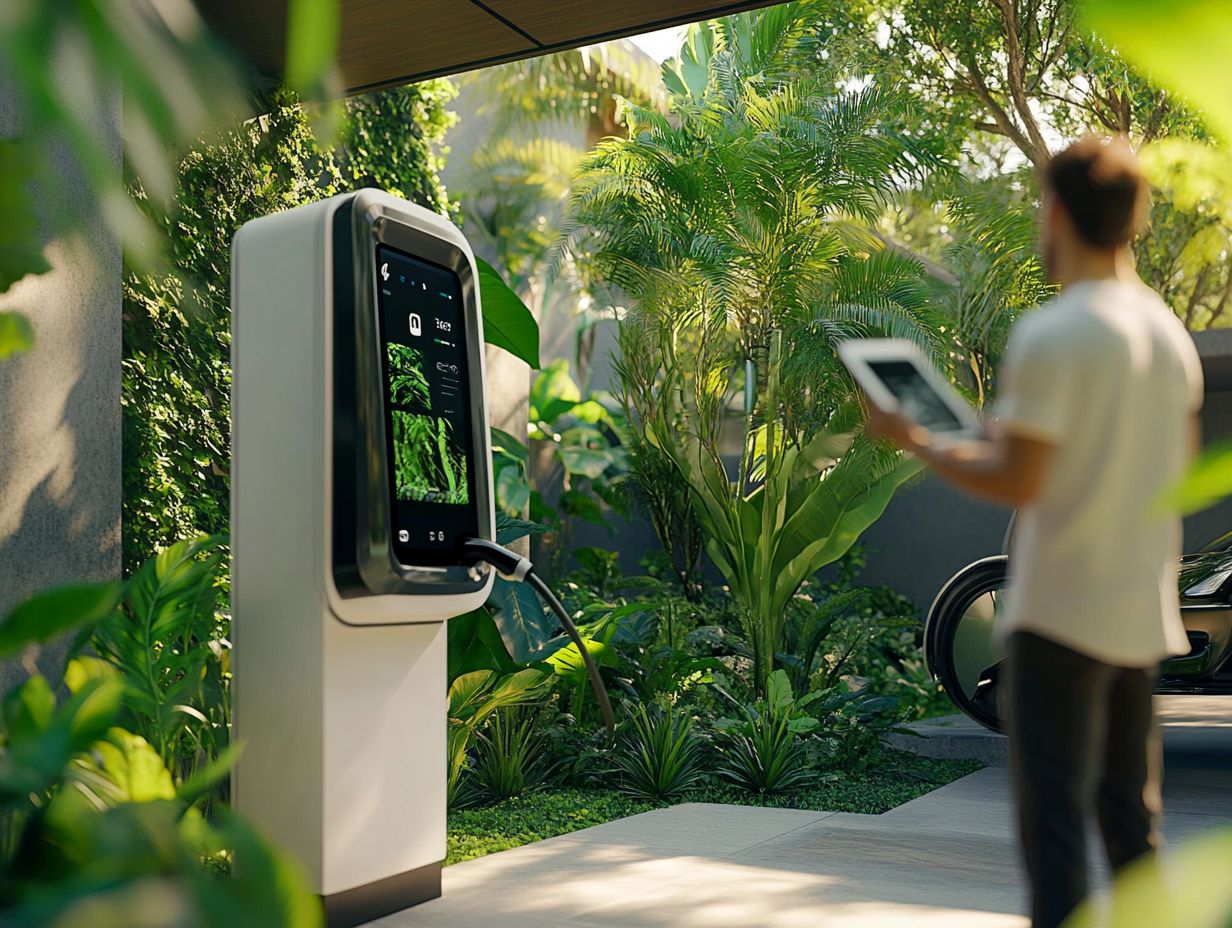
Smart technology in EV charging enhances efficiency and convenience while providing cost savings for both EV owners and charging station operators.
Wireless charging and smart charging stations are transforming the EV charging experience.
The impact of smart technology on the EV industry includes a rise in EV adoption and improvements in infrastructure, though challenges and limitations persist.
What is Smart Technology in EV Charging?
Smart technology in EV charging integrates advanced technologies like AI and communication technology, designed to elevate your charging experience for electric vehicles (EVs).
This innovative approach enhances charging efficiency and significantly improves user convenience. As a vehicle owner, you can easily access charging infrastructure and manage your energy consumption.
By leveraging artificial intelligence, these smart charging systems analyze real-time data to predict peak demand times and adjust charging schedules. This helps you minimize energy costs while supporting a sustainable energy management system.
Communication technology tracks your charging patterns, offering personalized recommendations to reduce overall charging time. As more charging stations adopt smart technology, you ll enjoy a user-friendly experience that ensures optimal charging solutions are always at your fingertips when it s time to power up your vehicle.
Benefits of Smart Technology in EV Charging
Smart technology in EV charging is game-changing! It offers incredible benefits, enhancing efficiency and saving you money.
By utilizing advanced technologies within the charging infrastructure, you can experience a seamless charging process that reduces downtime and maximizes energy efficiency.
Efficiency and Convenience
Efficiency and convenience are hallmarks of smart EV charging technologies. They enable you to easily locate and use charging stations while dramatically reducing charging times.
These advancements redefine the charging experience, making it more accessible and user-friendly. Mobile apps provide real-time updates on station availability and even allow you to reserve a spot ahead of time.
RFID technology further enhances convenience, granting you seamless access to chargers with just a tap. Dynamic charging methods adjust the speed based on demand and battery status, simplifying the entire process.
By incorporating these cutting-edge features, smart EV charging not only enhances your experience but also encourages enthusiasm for adopting electric vehicles.
Ready to embrace the future of EV charging? Explore smart charging solutions today and join the electric vehicle revolution!
Cost Savings
Implementing smart technology in EV charging can lead to substantial cost savings. This is achieved by optimizing energy management and minimizing the operational costs associated with your charging infrastructure.
This technology employs advanced energy management systems that continuously monitor and adjust energy consumption in real-time.
By strategically timing your charging sessions during off-peak hours, you can avoid peak demand charges. These charges often inflate electricity bills dramatically.
These systems analyze usage patterns and forecast energy needs. This allows you to cap your energy consumption more efficiently.
As a result, you not only mitigate immediate costs but also enhance your long-term operational strategies. This makes them more sustainable.
This approach reduces your carbon footprint and improves overall efficiency in energy utilization. With such capabilities in place, you can witness a marked improvement in your bottom line while contributing to a greener future.
Types of Smart Technology in EV Charging

You ll find a variety of smart technologies in EV charging, each meticulously crafted to enhance both the charging process and your overall experience.
From wireless charging solutions to smart charging stations brimming with advanced features, these innovations elevate your journey into the future of electric vehicle ownership.
Wireless Charging
Wireless charging technology enables you to charge your electric vehicle without the hassle of physical connectors. This presents a more convenient solution that could evolve into dynamic in-road wireless charging in the future.
This innovation streamlines the charging experience for drivers like you. It integrates beautifully into existing urban infrastructure.
Picture this: recharging your EV simply by driving over specialized charging pads embedded in the road. This eliminates range anxiety and fosters a greater embrace of electric mobility.
The principles behind this technology hinge on magnetic resonance. This allows power to be transferred efficiently over short distances.
As advancements in this area continue to progress, the benefits become increasingly evident: reduced wear on connectors, lower maintenance costs, and a significant reduction in the carbon footprint typically associated with traditional charging methods.
By adopting such solutions, cities can encourage the growth of sustainable transport systems, paving the way for a greener future.
Smart Charging Stations
Smart charging stations are the cornerstone of today s EV charging infrastructure. They combine advanced technology with seamless connectivity to enhance your charging experience.
These stations offer a dependable way to recharge your electric vehicle. They come equipped with features that enable real-time monitoring and management of energy consumption.
By harnessing technology that connects and manages energy use, you can schedule your charging sessions during off-peak hours. This potentially lowers your electricity costs while easing the strain on the overall power grid.
With the integration of smartphone applications, you gain valuable insights into available charging locations, pricing options, and even predictive maintenance alerts. This makes your transition to electric vehicles not just easier but also more intuitive.
These charging stations are game changers, offering much more than just convenience! They play a pivotal role in advancing sustainable transportation solutions.
Impact of Smart Technology on the EV Industry
Smart technology is revolutionizing the electric vehicle (EV) industry now more than ever! It accelerates the adoption of electric vehicles while catalyzing substantial advancements in charging infrastructure and battery innovations.
In conclusion, embracing smart technology in EV charging not only leads to significant cost savings but also promotes sustainability. As we move towards a greener future, investing in these innovations is essential for both individuals and cities alike.
Increased Adoption of EVs
The rise of smart technology in EV charging is significantly contributing to your comfort with electric vehicles. It addresses common concerns like range anxiety and the availability of charging stations.
These innovations not only simplify the charging process but also elevate your overall experience. By incorporating features such as real-time monitoring, predictive analytics, and mobile app integration, smart charging solutions give you the power to easily locate the nearest charging stations and plan your routes with confidence.
Automatic load balancing ensures that charging stations are utilized efficiently, reducing wait times during peak hours. As a result, you can feel secure in your decision to transition to electric mobility, knowing that your charging needs will be met seamlessly.
Smart technology creates a vital framework for the broader acceptance and integration of EVs into your daily life.
Improvements in Infrastructure
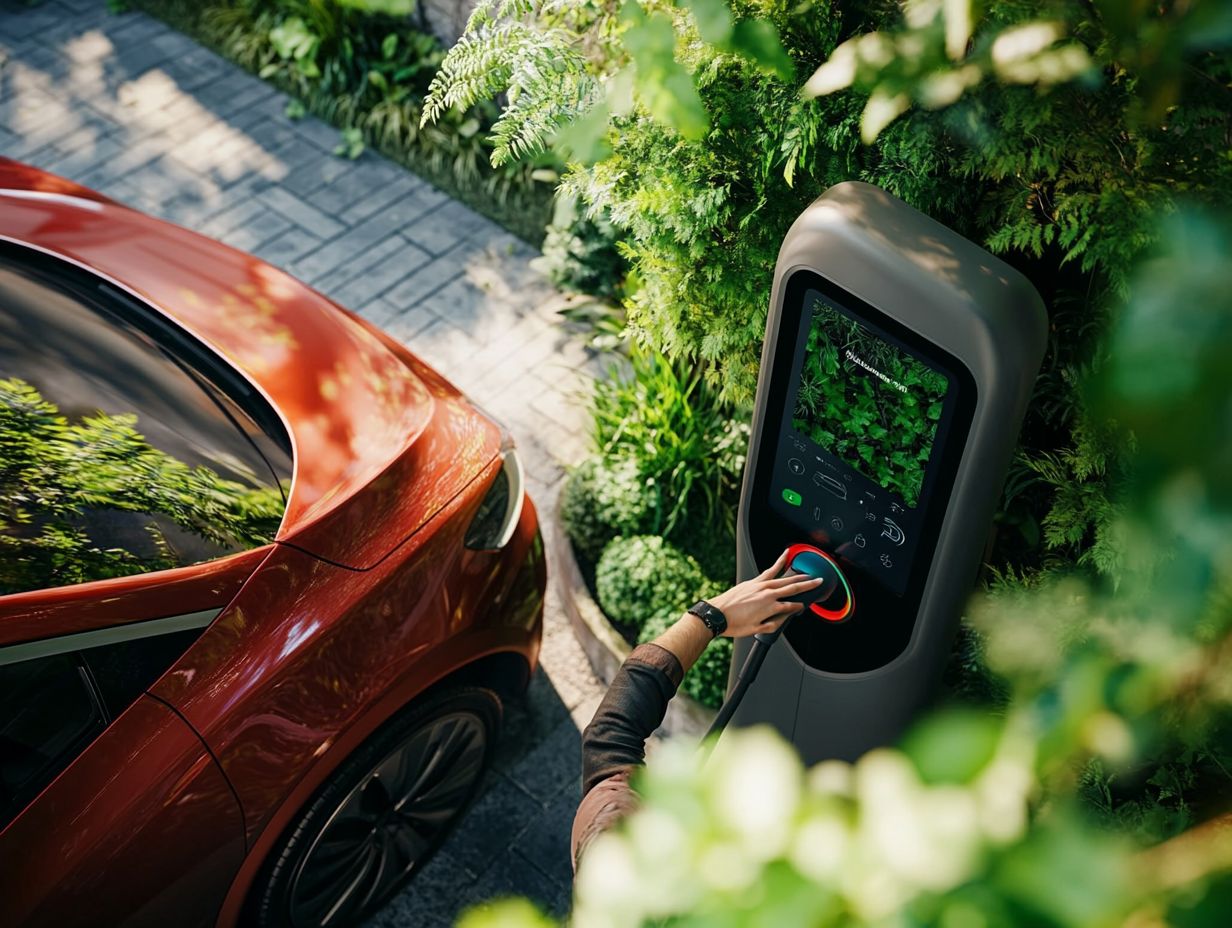
Smart technology has revolutionized EV charging infrastructure, highlighting the evolution of EV charging technology. It brings about significant enhancements in charging hubs and establishes a robust EVSE network that elevates overall energy management.
These advancements go beyond merely increasing the number of charging stations; they incorporate intelligent systems designed to optimize energy distribution. This ensures power is delivered precisely where and when it s most needed.
The integration of renewable energy sources, combined with real-time energy monitoring, plays a pivotal role in this transformation, giving you the power to minimize your carbon footprint while maximizing efficiency.
Advanced software solutions predict charging demand and manage energy flow, effectively preventing grid overload. These innovations create an ecosystem where electric vehicles can flourish, seamlessly integrating with the smart grid to foster a more eco-friendly future.
Challenges and Limitations of Smart Technology in EV Charging
Despite the many benefits, the integration of smart technology in EV charging presents its own challenges and limitations.
You might face technological constraints and cost barriers that could impede the widespread adoption of these innovations.
Technological Limitations
Technological limitations in smart charging can present substantial challenges, especially regarding the effectiveness of charging algorithms and the implementation of protocols like OCPP 2.0.1.
These challenges often arise from the necessity for robust algorithms that can efficiently manage energy loads while also adapting to variances in consumer behavior and grid demands. The absence of standardized communication protocols can impede interoperability between various charging networks and electric vehicle models, resulting in inefficiencies and user frustration.
To truly unlock the potential of smart charging solutions, you must address these critical gaps through collaborative efforts. Enhancing the compatibility of charging infrastructure and ensuring that algorithms are capable of real-time data processing will be key to achieving optimal performance.
Cost Barriers
Cost barriers present a considerable challenge for you when it comes to the widespread adoption of smart EV charging technologies. This impacts planning charging stations and maintaining reliable energy.
These financial hurdles often dissuade a range of stakeholders, from local governments to private investors, from making the necessary upgrades. The initial capital requirements for smart chargers, coupled with the need for extensive grid modifications, create a formidable obstacle, particularly in regions with tight budgets.
Without strategic investments in supporting technologies like energy storage and enhanced grid connectivity, the potential benefits of a smarter charging network remain unfulfilled.
This situation highlights the critical need for collaboration between the public and private sectors to develop innovative financing solutions that can alleviate these cost burdens. Ultimately, this collaboration is essential for paving the way toward a more robust and sustainable electric vehicle ecosystem that you can be a part of.
The Future of Smart Technology in EV Charging
The future of smart technology in EV charging presents an exciting array of possibilities. There are potential developments that could transform the landscape.
You can expect advancements in battery innovations and the rise of smarter infrastructure, setting the stage for a revolution in how we approach electric vehicle charging.
Act now to embrace the electric vehicle revolution!
Potential Developments and Innovations
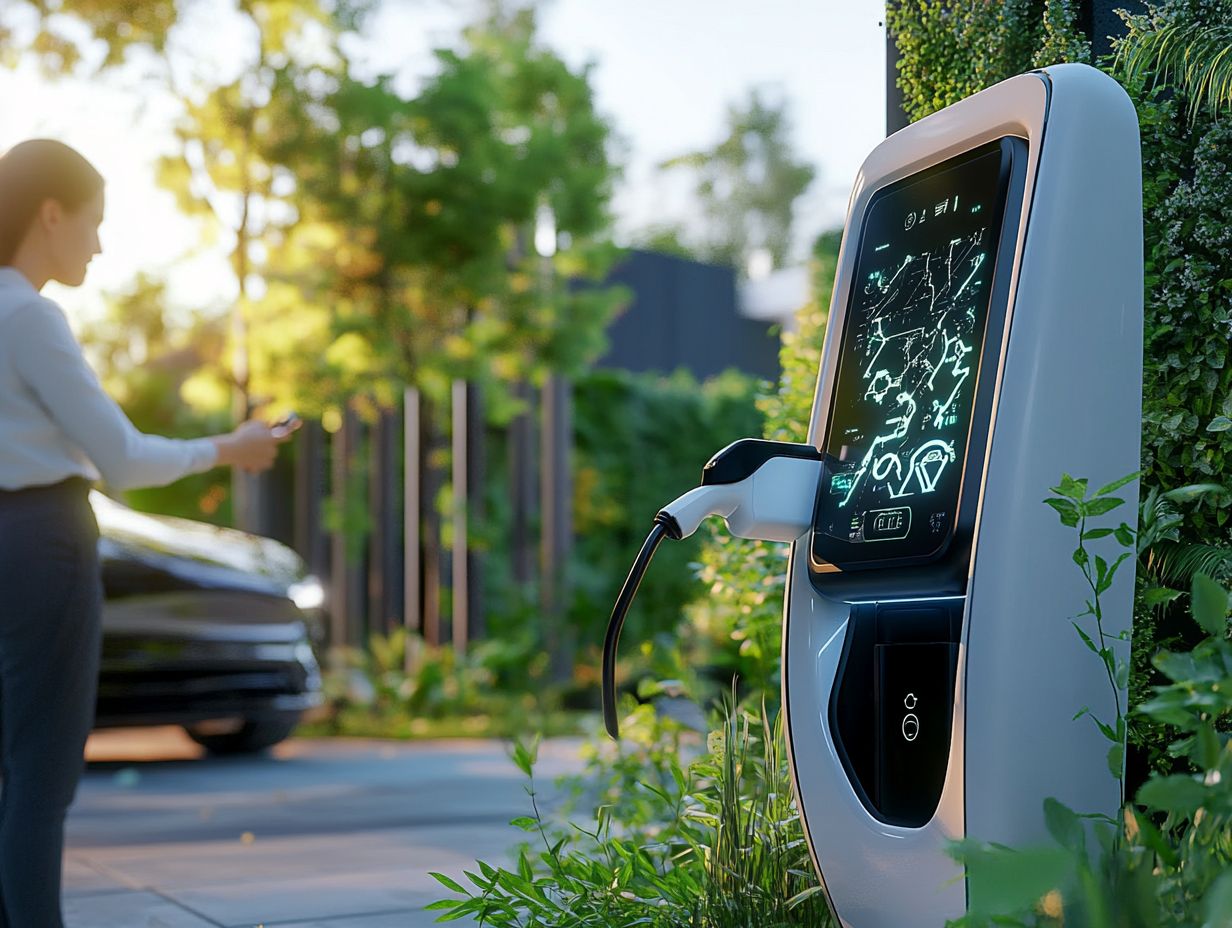
Potential developments and innovations in smart technology for EV charging are on the horizon. Solid-state batteries and bidirectional charging are leading the charge.
These advancements could significantly elevate charging efficiency and enhance vehicle integration. You can now imagine a world where charging times are reduced dramatically, and battery lifespans are extended.
Solid-state batteries replace the liquid electrolytes found in conventional lithium-ion models with solid materials. This results in higher energy density and improved safety.
Bidirectional charging gives your electric vehicle the power to not only draw energy but also return it to the grid. This creates a dynamic energy ecosystem that may lower your electricity costs while contributing to grid stability and renewable energy integration.
These innovative solutions are poised to redefine the future landscape of the electric vehicle industry. They present an exciting opportunity for you to be part of a more sustainable world.
Frequently Asked Questions
How does smart technology improve the efficiency of EV charging?
Smart technology allows for real-time monitoring and management of EV charging. This ensures that charging is done at optimal times and rates.
This can save time and costs for both EV owners and utility companies.
What types of smart technology are used in EV charging?
Examples of smart technology used in EV charging include smart charging stations and intelligent software for managing charging. Vehicle-to-grid integration is also critical for bidirectional energy flow.
How does smart technology help with grid integration of EV charging?
Smart technology can help balance the demand for electricity by enabling managing electricity use. This means EVs can be used to send energy back to the power grid when needed, reducing strain on the grid.
Can smart technology also improve the user experience for EV owners?
Yes, smart technology provides a more convenient and seamless experience for EV owners. This includes features such as remote charging management and scheduling charging times.
You can also receive real-time updates on charging status.
How is smart technology making EV charging more accessible?
Smart technology enables the development of public charging infrastructure that is user-friendly and accessible. This includes features like mobile payment options and real-time availability information.
It also provides navigation to nearby charging stations.
What role does smart technology play in promoting sustainable transportation?
Smart technology is a key component in promoting sustainable transportation. It makes EV charging more efficient, convenient, and accessible.
This can encourage more people to switch to electric vehicles, reducing carbon emissions and promoting a cleaner environment. Join the movement towards a more sustainable future!

